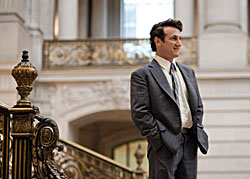 |
The framing device is a spookily prophetic self-recorded address Milk dictates to a tape recorder to be played in the event of his assassination. The address, rambling biography mixed with political manifesto, loosely bookends each chapter in Milk's life following his political awakening relatively late in life. By diminishing a detailed treatment of character development, Milk hits its somewhat dense plot points, yet without sacrificing authenticity. The start of the film has Sean Penn as Harvey Milk on the eve of his fortieth birthday, still in his corporate avatar, impulsively picking up a young stranger (James Franco). There is banter that displays Milk's charm and self-deprecating wit, a scene of delicious but modest love-making, and in mere minutes of screentime, Milk has left his job and is heading to the exploding gay scene in San Francisco's Castro with his newfound lover. It's a risky arrangement and though it is cogent and disciplined with smart editing and good storytelling, it stifles a dramatic arc from emerging. Intoxicated with the burgeoning sense of community and his early successes of organising, Milk embarks on a series of attempts to run for office for the San Francisco's powerful Board of Supervisors. It's only halfway into the movie, that Milk, brimming with confidence at his appointment, begins his historic battle for gay rights, opposing the tide of anti-gay legislation illustrated with archival footage of Anita Bryant speaking. It's that staccato of events, a certain frenetic historic record, that propels the movie onward.
Despite the inherent limitation of characterisation, Gus Van Sant draws out powerful, substantial performances from his almost too-crowded cast, and is well served by a script that refuses to deflate any of Milk's supporting characters. James Franco impresses as Milk's first partner in the film, as does his delirious and unstable replacement, Jack Lira played by Diego Luna, and his political team, particularly Emile Hirsch's wonderful turn as Milk's prot?g?. Sean Penn's performance in the lead has already elicited Oscar chatter (and the subsequent backlash). It's an awesome transformation; Penn seems to channel Milk from every fibre of his person. But the real alchemy is the strangely lyrical antagonism-the empathy, the strangulated friendship, and the simmering anger-between Milk and his rival and eventual assassin, Dan White, played by Josh Brolin. It is the space in the film where Van Sant lowers his self-imposed barriers and returns to the affective and moody exploration of the psyche that marks his more experimental work.
In some ways, Milk is an instructional manual for old-school 1970s political action of the American New Left: organising across lines of class and race, vigorous rabble-rousing protest, exploiting the press, and the specifically Queer strategies of visibility. But it is also a close study of the dimension of personality in the world of realpolitik, where Milk's indefatigable cheer, his winning charisma and his willingness to use his influence earns him allies in the backrooms of power. Sometimes clearly by design and sometimes perhaps by accident, Milk manages slanted criticism of the topical politics of the present. But the glaring concurrence is the film's Prop. 6, an amendment on the ballot aiming to block gay teachers and their supporters from teaching in schools in California and this year's recent Prop. 8, which succeeded in repealing that same state's same-sex marriage laws. It seems to highlight an underlying contention of how, with a movement's work unfinished, history folds endlessly upon itself.
Milk
Director: Gus Van Sant
Cast: Sean Penn, James Franco, Josh Brolin, Diego Luna, Emile Hirsch
2008. R 128 mins.



